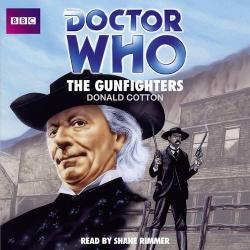Doctor Who - The Gunfighters (AudioGo Novelisation)

Doctor Who - The Gunfighters
Originally starring William Hartnell
Written by Donald Cotton
Narrated by Shane Rimmer
Released by BBC AudioGo, February 2013
Doctor Who – The Gunfighters is one of the more successful products of an experimental period for the Doctor Who novelization range. The mid-1980s saw W H Allen/Target make increasing recourse to the adventures of the first and second Doctors to fill out their publishing schedule, and where possible sought the authors of the original serials to write the books. This had mixed results, with some titles demonstrating their authors’ unfamiliarity with prose writing and with Doctor Who. Donald Cotton was an exception. Despite the eighteen years between his last televised serial and his first novelization, Donald Cotton demonstrated a clear understanding of who the Doctor was and the conventions of his adventures. In both his books he reinvented for prose his preoccupation with competing interpretations of historical events, the varying motivations of narrators and the needs of audiences. The crises in The Gunfighters derive as much from the problems of storytelling as they do to the perils in which the Doctor, Steven and Dodo find themselves. The self-consciously convoluted narrative framework offers many opportunities for an imaginative reading. Instead, AudioGo’s edition of the story becomes its second performance to fall through not being sufficiently quick on the draw for Donald Cotton’s sharpshooting.
There's a rationale behind the casting of Shane Rimmer; an authentic North American voice, albeit Canadian and long resident in the United Kingdom as well as one of the few survivors from the cast. His reading at first makes a good impression, grinding out the tones of Cotton's narrator persona, the author's interpretation of the historical journalist and myth-maker of the Old West, Ned Buntline. The listener might wonder whether Rimmer's voice is going to change for the Buntline-as-Holliday main narration, but it doesn’t, despite the theatricality of the conceit. In much of the narration Rimmer sounds unintentionally perplexed and his tone at chapter breaks imply surprise at how long the book is. His handling of the book's raconteurish language is often indistinct, while at the same time too straight for Cotton's archly self-aware style. Buntline-as-Holliday is an unreliable authorial voice, whose pronouncements are full of implausible knowledge which draw attention to how contrived the situations are. Rimmer isn't light enough to present this effectively or consistently. His performance does gain pace and expression on the final disc, in the run-up to the gunfight at the O.K. Corral itself, but it takes a long time to get there.
Given Rimmer's unengaging narration, Simon Power's sound design has little to work with. The decision to punctuate the text with music cues in the spirit of Ennio Morricone are a hint of the playfulness which might have been. Instead, they jar with the prose and pull in a direction which does not run well over Rimmer's boulder-strewn delivery. Though the targets of Cotton's parody for the television version of The Gunfighters were of traditions older and more familiar to young audiences than the Sergio Leone westerns in vogue in cinemas in the mid-60s and which Power references, Leone's films and Morricone's music were at least of the same cultural generation as The Gunfighters and drew if not from the same well but from the same course of western legend.
There is still much to enjoy in the book if one can get past the flaws of the realisation. Johnny Ringo has a knack for apposite brutality but an addiction for Latin tags which lead him to claim the Doctor as his soulmate and to look down on the practical skills of the medically-qualified Holliday. At the mercy of events, Steven and Dodo move from elation at being in the 1960s playground realm of the Wild West, to revulsion at the realities of a society where kidnap and murder are commonplace. Donald Cotton is true to the Doctor as a character rather than a principle of intervention, a fallible traveller whose wisdom is balanced by innocence of the more mercenary details of human relationships. This is, after all, the Doctor Who book which included the term 'cat-house' and noted that Kate Elder knew 'which side her bed was bartered'. Appropriately, the assemblage of 'fancy dress desperados' is a 'finale' to a grand show, the last of its kind. Johnny Ringo is preoccupied by the death of the west, and just as this tale is supposedly related to and by Ned Buntline, the vaudevillean Eddie Foy is keeping the violence at a safe distance while his historical counterpart would later relate his acquaintance with Earp, Holliday and Bat Masterson. Even as bullets fly, some of the participants are already engaged in the process of distancing the Wild West into safe entertainment. The universe breeds the most terrible things, but we deal with them by turning them into monsters larger than life, whether they wield laser guns or Buntline specials. It's worth remembering that some of the historical originals of the characters in The Gunfighters were still alive within Donald Cotton's lifetime, removed from the figures of legend not just by age but by transformed context: Kate Elder died in Arizona in 1940, while Wyatt Earp died in California in 1929, spending his final years advising Hollywood filmmakers on western pictures. Challenging to realise it may be, but in its sideways reflections on how we deal with real-life horror and the passage of time, The Gunfighters shows a deep understanding of the potential and the effectiveness of Doctor Who.







